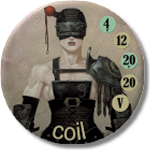But I do think this sort of thing is mathematically sort of cool, if not a deep decision problem: in the picture below, J. is forced to take my p20 and then I need to sweep his remaining dice. I can afford to lose either one of my remaining dice, but not both. I could either start with the d12 and then switch to the d6 if the d12 is captured, or start with the d6 and switch to the d12 if the d6 is captured. Does it matter which one I start with?
Can you generalize the result? Can you give a good intuition to back up the computation?
Game #8952 • ElihuRoot (Coil) vs. Jota (Bunnies) • Round #2
UBFC 73
Opponent's turn to attack

p(4) (12) p(20) (20) (V)
Button: Coil
Player: ElihuRoot
|
Player: Jota
Button: Bunnies
(1) (1) (1) (1) (X)
 |
1 comment:
My instinct is to always reroll the biggest die i can afford to lose, because what matters is the number of failures, so maximizing the chances of winning the earlier challenges at the cost of later chances that may not happen has to be the right thing to do.
That's obviously the right thing to do if i can't afford to lose any dice. I don't think it's different if i can afford to lose one die.
Huh, interesting, but it is --- the math says it doesn't matter which die i roll first.
Post a Comment